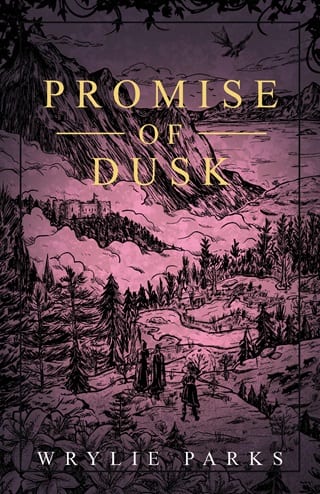Chapter
38
Mariana
She looks just like me.
Some nameless slave, her pale skin, flaming hair, all wild temper. Now, she lies in puddles, her hair in wet tangles where it hangs into scarlet pools—her death painted on the rocks in her own blood.
She was a fool. She fought back for her dignity, fought the soldiers that dragged her to the post and readied themselves to lash her. I cannot decide if it was suicide or bravery. I cannot tell if it was strength. If it would have taken more strength to shut up and take it.
I swipe at my cheeks, smearing the spatters of her blood across my sweat-dampened skin. War paint.
This is what it means to ask for more. This could be the consequence of this choice I’m making. Playing chess with lives.
As they drag her limp body off to the burn piles and the numb drift off to their dinner, I stay there. I watch the trail of blood fade into dried dark smudges on the tan rock .
I look back up at the cliffs above, seeking that cloth, fluttering in the wind far above, peeking out from a cliff.
It’s been fourteen days.
Fourteen days of pain and back-breaking work.
I count them on the wall I sleep against. A small rock scratching tallies in the wood of the shack. Every day feels like an eternity.
In those days, fire has spread—flame licking across a dry field.
I can’t learn their names. Too many that I break my fast with, don’t see the dusk. So I know Dierdre, and two of her most valuable assets to my plan, Emris and Zarah. I try not to get to know the others too well. Knowing their names makes them a full person, not just a slave. Knowing their name reminds me that their mother painstakingly picked it out for them when they were babies. Reminds me they were children once. Reminds me they had lives and loved ones.
The slaves, the ones trusted by Dierdre, know that something is coming. It takes a steady hand to keep them from riling. Few of them have genuine hope, but a few have a spark in their eyes. It’s dangerous to my plan, but I need the majority of them to have my back when the time comes.
“You’ll miss dinner if you keep standing there,” comes a voice from my left.
Dierdre stands there, back ramrod straight, shoulders pulled back, chin lifted. Such perfect posture for a slave. Everything about her screams well-bred—her speech, her countenance, her influence. How she ended up in this hell, I’ll never know.
It’s interesting how even here, in a place where we know only survival, people still seek community. Still look for hope and reason in each other’s eyes. Still look for someone who might be able to make choices for us, give comfort and advice.
I wonder if I will ever be enough of that for my people. And I wonder if I look like that to them—like a pillar. My posture certainly isn’t as good as Dierdre’s, no matter how much my mother poked and prodded at me about it.
I follow her, tearing my eyes from the waving cloth. As I go, I see them. The markings on the roosts, the guard houses, the back alleyways. Signals marked in my own blood to my outside friends, telling them where to strike first and hardest.
“Dinner is a really generous term, Dierdre,” I grumble. “Did you ask them?”
Her bare feet must hurt on the rocks as mine do, but she doesn’t show it. Her face is immovable, serene even, as she continues our walk to the troughs. She gives only a shallow nod.
I try not to look too eager, too hopeful. A slave never looks hopeful.
The Crows watch from their roosts, eyes following the two of us—like they hear us. I remember the hounds, the inhuman power they and those that control them possess, and I wonder if they can hear us from all the way up there.
“How were your sections today?” Dierdre asks innocently as we find our seats amongst the others. She gracefully accepts the piece of still-good meat from the man that sits beside her. Is everything still on for tomorrow?
One of the guards passes behind my back. I cannot see them, but I feel their vile presence, always lurking.
“As they always have been,” I say casually, our code familiar to me. The cloth is still white and waving.
“The birds are awfully restless today,” she observes.
She’s right. It’s like they can feel the hum in the air. The one I try with all my might to keep down. None of us comment further, the apprehension palpable.
The guards here are lazy at best, grossly negligent at worst—assured in their conquest, their control. Today is different. Their armor is polished. They stand at firmer attention. The Crows exert more control over the human guards, shoving and threatening them when they dawdle. Someone is holding them to standard, and I don’t know why. It is one factor that I hope my compatriots on the outside will see. Will they change the color of the cloth if necessary? Having to trust the others, sitting in my own ignorance, feels like an itch under my skin.
“We could use some rain. I miss the wildflowers,” Dierdre says. The few in our circle know what we are on about. They know not to care for the stupid questions. The slave mines are in a brutally dry area of Suri. Of course we could use some rain, but what she says is we could use some weapons.
“You never know, maybe the gods will pull through. Perhaps it will even bring enough flowers for all of us,” I reply, nonchalant.
“We will need them. We cannot ward off the hopelessness for long without them.” The others in the circle look at me seriously, nodding their agreement.
“They’ll come,” I assure. “I’ll tell you when I see some.” I take a big bite of foul-looking sludge, grateful to have abandoned my sense of taste as Dierdre predicted. I must eat something; I feel the lack of food in my bones. Literally. The couple of weeks of going without, of long days wielding the axe, are making themselves known in the jut of my hipbones and caving in of my stomach. The shaking of my arms from simply existing. But I know, as I know the sun will rise, that when the time comes, I will not fail. I will not falter.
I am a flame of this rebellion, and I will not falter or dim .
As the days have turned to weeks, this mission has turned into something more. Freeing these people is more important than my own purposes. Even if it would not serve my cause, this is a worthy cause to fight for.
The only part that gives me pause is this: what life am I freeing them to, if the rebellion dies?
One of endless struggle, living only to survive? That is no life.
And so I will not falter or dim.
I will burn, and burn, and burn until there is nothing left of me.
 Fullepub
Fullepub 



